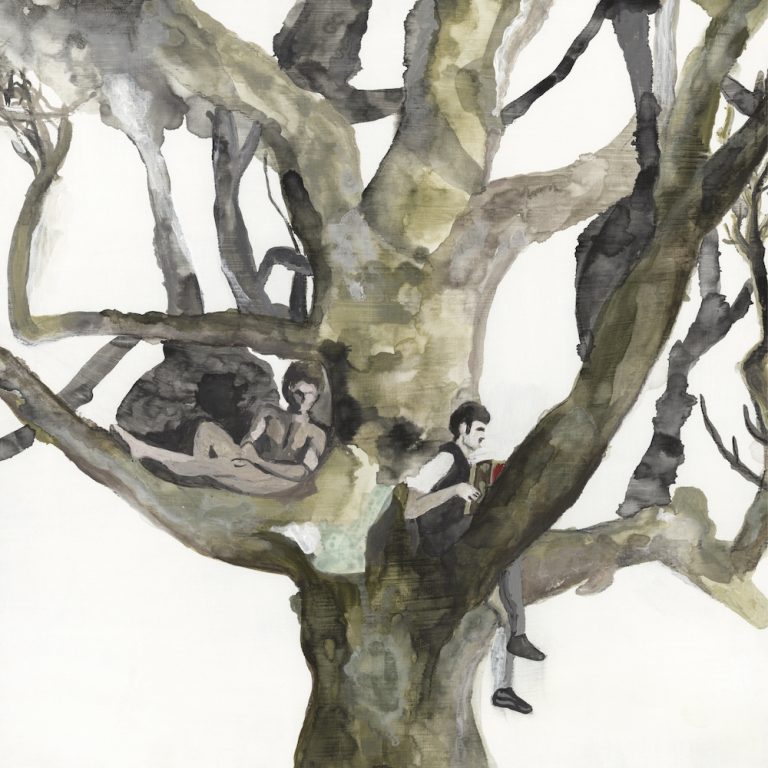The only predictable thing about Dan Bejar is his unpredictability. From his work with The New Pornographers to his solo work as Destroyer, Bejar has cultivated his evolution from a reliable indie rock pioneer to a daring visionary who pacifies the mind and heart. On his wildly subversive 13th album Labyrinthitis, Bejar flips the script on his audience, breathing new life into a project already full of prosperity.
2011’s Kaputt is still highly revered, often quoted as Bejar’s watershed moment, a warm pop album that pivoted from his melodic masterpiece Destroyer’s Rubies. But Bejar has never been one to look back, he always looks ahead at what the Destroyer project can become, and Labyrinthitis arrives as yet another intriguing evolution. And this time he might get the same level of plaudits he once received, since the response to his last few hasn’t been unanimous (looking at you Ken).
Regardless, Labyrinthitis is Bejar’s best work since Kaputt. At this point, Bejar has several classics under his belt, so there’s no desperation here to create another one, but he manages to do it with ease – perhaps exactly because he’s not obviously aiming for praise. The densely sprawling opener “It’s In Your Heart Now” plays itself close to the chest, giving only vagueness over a carefully honed synth-and-guitar drone – yet it still manages to be heartfelt and warm. Its sonics pulsate wondrously for minutes on end, capturing serenity in a bottle and allowing it to float down the river safely.
Early highlight “June” finds him taking aim at disingenuous socialites in a layered conundrum of textures that all somehow neatly assemble underneath the Destroyer sound. It’s unmistakably Destroyer, but also not. The warped spoken-word outro throws everything into a confounding yet thrilling loop, but even before that the myriad of bold instrumentation that Bejar employs on “June” is like nothing he’s ever done before. “A moment alone please” he begs, but how can we turn away from such an impulsive jam?
This isn’t new territory for Bejar, he’s manipulated sounds into gloriously obtuse segments before, but on Labyrinthitis it all blends smoothly with his batshit vocal detours when it probably shouldn’t. Never one to shy away from smashing his malleable voice to fit his agenda, Bejar takes grim flight on “Tintoretto, It’s For You” to go with his dour Funkadelic synth and drum laden death musings. It all comes together in a perfect incoherence that’s refreshing and lovely.
Then there’s “Suffer”, the diabolically tongue-in-cheek takedown of fame hunters. “All the girls got soul, and the boys got soul / and the world’s gotta know it was you, it was you,” he bemoans while pinpointing the exact feelings society has about those with more than enough, “Suffer ‘neath the weight of the grandeur / You’re poisoning / Really poisoning.” This isn’t a political album though, Bejar is just being as honest as he always is which is comforting.
“Eat the Wine, Drink the Bread” is a mixing bowl of tantalizing ingredients, all swirling and bopping while Bejar pisses on the floor, naturally underscored with a danceable beat and handclapping to perfectly soundtrack a night of debauchery. It’s all so silly but effortlessly cool at the same time. On the contrary is “All My Pretty Dresses”, which encapsulates the loneliness of quarantine but unearths a beautiful instrumental core that can’t help but instil joy.
When he’s crafting such an off-kilter album, Bejar keeps us on our toes from track to track. This only seems to fall afoul with Labyrinthitis’ final challenge, the concluding and superfluous “The Last Song,” a bedroom guitar cut that wouldn’t have been out of place on Thief or City of Daughters. After 40+ minutes of Bejar’s idiosyncratic observation and criticism, the faux wisdom of “The Last Song” feels unnecessary; “You fake say “hello” and you fake say “goodbye” / You tilt your head up towards the sky and say, “Wow, look at the sun.”
Labyrinthitis is Bejar at his most villainous, challenging listeners and sneakily insulting those who are manifestations of today’s poorly-constructed diagram of self-worth. To the album’s last breath, Bejar is tirelessly poking holes in it, but he ultimately decries his futility by simply ending with “And that is maybe too many words to say”. Bejar closes his album with a throwback to his old self, bringing this reflective piece to a finale that’s just as biting as everything he’s released before.


